 Petzlover
Petzlover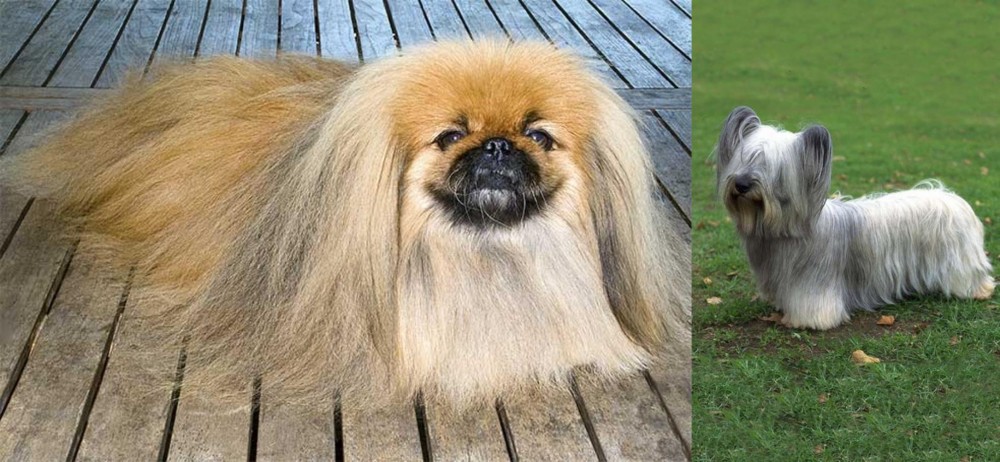 Pekingese is originated from China but Skye Terrier is originated from United Kingdom. Pekingese may grow 19 cm / 8 inches higher than Skye Terrier. Pekingese may weigh 11 kg / 24 pounds lesser than Skye Terrier. Both Pekingese and Skye Terrier has same life span. Both Pekingese and Skye Terrier has almost same litter size. Both Pekingese and Skye Terrier requires Moderate Maintenance.
Pekingese is originated from China but Skye Terrier is originated from United Kingdom. Pekingese may grow 19 cm / 8 inches higher than Skye Terrier. Pekingese may weigh 11 kg / 24 pounds lesser than Skye Terrier. Both Pekingese and Skye Terrier has same life span. Both Pekingese and Skye Terrier has almost same litter size. Both Pekingese and Skye Terrier requires Moderate Maintenance.
 This is an ancient dog breed that originated in China. Known also as Lion Dogs, they are toy dogs that have always been a popular choice for Chinese royals.
This is an ancient dog breed that originated in China. Known also as Lion Dogs, they are toy dogs that have always been a popular choice for Chinese royals.
DNA analysis tells us that these dogs are one of the oldest dog breeds there are and over the years, the dog has barely changed in looks.
The dogs found their way out of China, and as they started spreading to the USA and the UK, Pekingese clubs started emerging. A pekingese dog was registered by the American Kennel Club in 1906, and the Pekingese Club of America was formed in 1909.
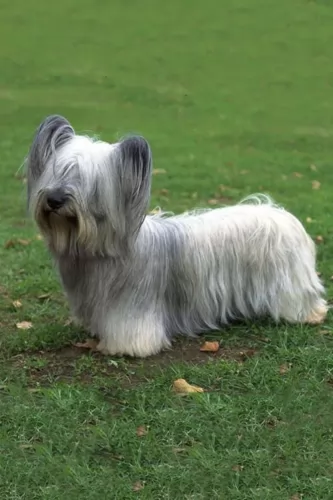 The Skye Terrier is a hardy dog breed and is actually considered to be an endangered native dog breed in the United Kingdom.
The Skye Terrier is a hardy dog breed and is actually considered to be an endangered native dog breed in the United Kingdom.
They were found on the Isle of Skye, although there is some confusion about its history. They were used long ago to hunt but these days they are essentially companion dogs.
They found their way to America and the Skye Terrier Club of America was founded in 1938. The American Kennel Club recognized the breed in 1887.
 The Pekingese is a dog which stands at between 30 – 45 cm and weighs anything from 3 to 7kg.
The Pekingese is a dog which stands at between 30 – 45 cm and weighs anything from 3 to 7kg.
His double coat can be fawn, cream, apricot, grey, or black or even a mix of some of these colors.
The Pekingese is known for its flat- or squashed face and his large, bulging type of eyes. His body is low to the ground and is somewhat longer than what it is tall. He has long, silky, feathery ears and his tail is plumed and essentially held over his back. The face usually has a black mask.
The Pekingese is a stubborn, independent, intelligent dog, but with his human family he is loving and loyal. People often look at the Pekingese and think that it is a delicate dog that just wants to sit on your lap and be cuddled. But this isn’t the case and the Pekingese is a dignified, robust, bold, confident dog. He is essentially an indoors dog though and will be content for a while to lie close to his human companion. He is calm and quiet indoors but is also game for some activity, being quite a playful dog.
The Pekingese is the kind of dog that will slot easily into city or country living. He gets on well with children but if he could choose, he would prefer to live with calm, consistent adults, as he doesn’t gel too well with raucous, undisciplined children.
He is a wilful dog and will require being trained and socialized to make him obedient and more amicable.
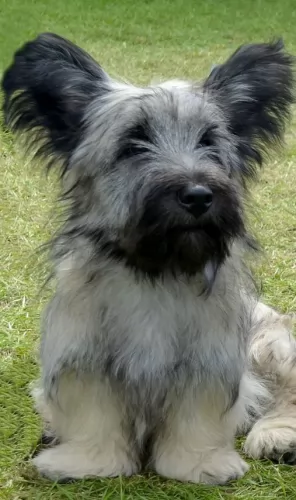 The Skye Terrier is a medium-sized dog standing at between 23 and 26cm in height and weighing between 12 and 18kg. The legs are short and sturdy. He is double coated with the top coat being straight and hard and forming a beard around the face area. The coat can be fawn, and in various shades of grey which are sometimes even black. The ears of the dog are medium sized and erect.
The Skye Terrier is a medium-sized dog standing at between 23 and 26cm in height and weighing between 12 and 18kg. The legs are short and sturdy. He is double coated with the top coat being straight and hard and forming a beard around the face area. The coat can be fawn, and in various shades of grey which are sometimes even black. The ears of the dog are medium sized and erect.
The Skye Terrier has always been a hunting dog and he enjoys quite a bit of exercise – walks, ball games as well as indoor games. Small though he may be, he is strong willed with a mind of his own and will benefit from being trained and socialized.
This is also necessary as he has a fairly reserved nature. He gets on well with children and makes an excellent family pet but he is ready to take on smaller pets in the home. He will bark when confronting strangers and makes an excellent watchdog too.
He is able to adapt well into life in the city or the countryside. He isn’t a dog to be left outside day after day and will just die of boredom, frustration and loneliness.
 Sometimes when his hair has grown long and he has a ribbon in it he may be looked upon as shallow, pathetic and nothing but lapdog. In reality his heart is brave, tough, dignified and confident.
Sometimes when his hair has grown long and he has a ribbon in it he may be looked upon as shallow, pathetic and nothing but lapdog. In reality his heart is brave, tough, dignified and confident.
All the Pekingese wants is to be a normal and loving pet for the right kind of person who appreciates all his strong characteristics.
He is capable of being quite lively and protective of his human family. Give him love and treat him kindly and firmly and you’ll find out why he is such a popular dog breed.
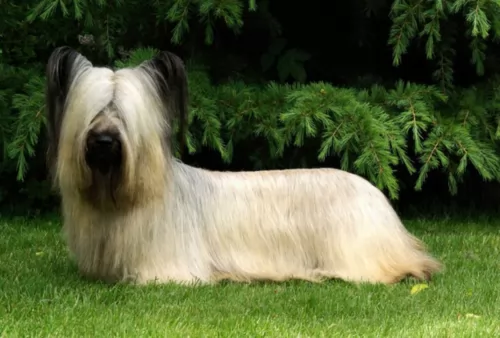 Give the Skye Terrier the attention he wants and he will reward you with his loving companionship.
Give the Skye Terrier the attention he wants and he will reward you with his loving companionship.
He loves the entire family but is best suited to homes where children have been taught to be kind to animals and to treat them with respect.
He has moderate energy levels and will expect you to give him a fair amount of exercise. The Skye Terrier can make an excellent companion for you and your family.
 The Pekingese can live to be between 10 – 15 years of age. One of the main medical problems with this dog is his squashed face which can be a source of breathing problems for him.
The Pekingese can live to be between 10 – 15 years of age. One of the main medical problems with this dog is his squashed face which can be a source of breathing problems for him.
The large, bulging eyes can also cause quite a few problems such as glaucoma, cataracts and eye ulcers. With Entropion the eyelid of the eye rolls inward and irritates the eyeball.
Your Pekingese shouldn’t be left outside as with his breathing problems, he isn’t good with regulating body temperature and can overheat in hot weather.
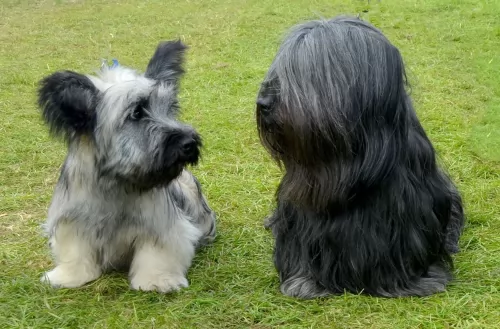 The Skye Terrier is a healthy dog breed. Perhaps the only issue that could be a problem with him is orthopedic problems. He is an achondroplastic dog, meaning a large body on small legs.
The Skye Terrier is a healthy dog breed. Perhaps the only issue that could be a problem with him is orthopedic problems. He is an achondroplastic dog, meaning a large body on small legs.
He could develop spinal problems if he were allowed to constantly be jumping off beds and high chairs.
Orthopedic problems affect the bones, muscles and joints and can actually be debilitating. Orthopedic conditions can be ligament tears or hip dysplasia for instance, accompanied by arthritis.
You’ll notice your dog has an abnormal way of walking or running, inability to get up once lying down and he may have arthritis and pain.Be careful because obesity can trigger problems with the joints and bones.
 Nothing is set in stone when it comes to the diet of your Pekingese or any other dog for that matter. How much a dog eats will depend on his breed, his age, his size and his activity levels.
Nothing is set in stone when it comes to the diet of your Pekingese or any other dog for that matter. How much a dog eats will depend on his breed, his age, his size and his activity levels.
Every dog is an individual and your Pekingese is too. Good food however dictates a lot on how healthy your pet will be so it will be to his benefit to give him the best quality commercially manufactured food there is.
He loves a bit of variety too so if you chop up some boiled chicken, brown rice and some wholesome vegetables such as carrots, spinach and sweet potato and add this to his kibble occasionally he will be delighted. He doesn’t want anything unusual or spicy because he can’t bear to have an upset stomach.
He must never be without a continuous supply of fresh, cool water.
The Pekingese doesn’t have serious exercise needs, and a little bit of running and exerting himself can have him snorting and grunting. A slowish walk outside will satisfy his exercise needs.
The coat of the Pekingese is long and thick and if you choose to keep it that way it will require brushing at least twice a week. Some people prefer to have the dog’s hair cut professionally as then it is easier to manage.
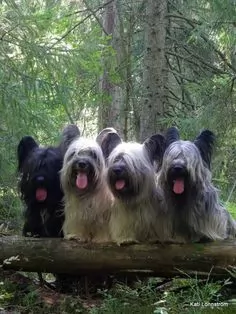 ● The coat of the Skye Terrier is long and silky and will most certainly require brushing every day if you keep the hair long. Such silky hair can easily become matted.
● The coat of the Skye Terrier is long and silky and will most certainly require brushing every day if you keep the hair long. Such silky hair can easily become matted.
● Little dogs like this will need their teeth being checked regularly. You can even try to buy special pet toothpaste and toothbrush and brush his teeth yourself. If you prefer, a professional dog groomer can do this for you and at the same time trim his nails and check his ears and clean the insides of the ears too to avoid infection.
● Provide him with top quality food as the quality of the dog food you buy makes a huge difference to his health and longevity. He is a small dog and there are some excellent commercially manufactured dog foods specially made for small, energetic dogs.
Try to include some home-made food for him which can be simply mixed into the dry kibble twice a week. Boiled chicken, brown rice or pasta and spinach, sweet potatoes and carrots is super tasty and nutritious. Ensure there is always a bowl of fresh, cool water within his reach.
● Keep his vaccines up to date against some deadly canine diseases, and get him to the vet when he shows signs of illness.